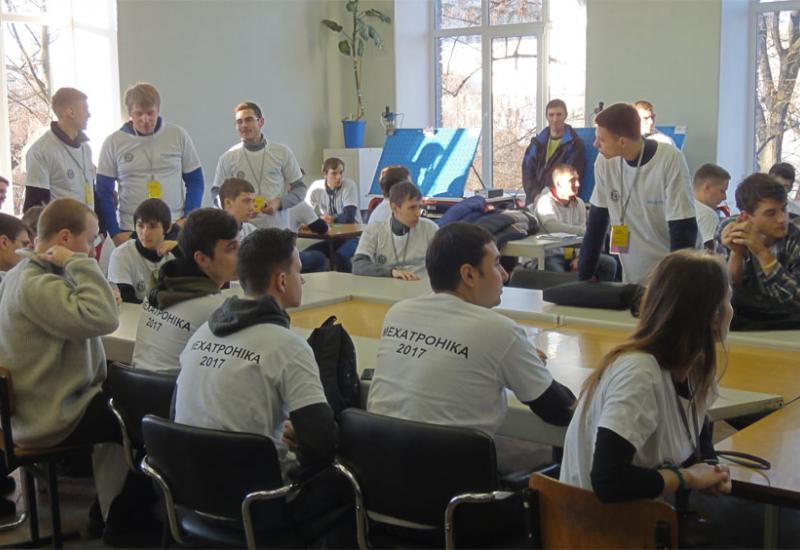The Department of Applied Hydroaeromechanics and Mechatronics has been already conducting the All-Ukrainian Student Olympiad "Mechanical Engineering in Mechanical Engineering" for nine years. But the latter was particularly attractive - changes in the list of specialties of technical education in 2015, and the autonomy of universities in relation to the formation of specializations were first mentioned in the composition of the participants.
All-Ukrainian competitions are considered the second stage of the Olympiad, but in fact the stage is the third one - for almost two years almost half of the participants are passing through the Summer School of Mechano-Tronics in the Igor Sikorsky Kyiv Polytechnic Institute. It affects the diversity and number of chairs that Olympic teams were preparing this year: theoretical mechanics and machine knowledge, robot mechanical systems, electrical engineering and mechatronics, forest machines, automation and computer-integrated technologies, machines and apparatuses, electromechanical and power systems, construction machines and equipment, automation and electric drive, applied mechanics, automation and computer-integrated technologies, mechanical engineering and transport, computer-integrated technologies and measuring techniques and applied mechanics and machines, mechanotronics, applied mechanics, integrated automated control systems, mechatronics and packaging machinery, machines and equipment for technological processes, computer-integrated technologies, automation and mechatronics, designing machines and equipment, automation of technological processes and robotic systems, applied Hydro-aeromechanics and Mechanotronics. And all students and all leaders found a common language both in tasks, in assessments, and in methods of resolution, in the distribution of medals and diplomas, and in the views of the future.
By calculation, the number of departments (25) significantly exceeds the number of teams (18) - synergistic mechanotronics has encouraged the cooperation of mechanics, computer specialists, specialists in integrated systems, bioresources and nature management, builders, food workers, electronics, forestry and engineering specialists. In the first years of the Olympiad there were exclusively departments of engineering departments and departments. The word "mechanotronics" was present in the name of only one department. Nowadays 7 departments and 3 faculties have a clear mechanotron-robotic direction. Another six departments of automation and computer-integrated technologies also feel at home at the Olympiad. Most managers were interested not only in the tasks and course of the competitions, but also in the curriculum, teaching methods for special disciplines, approaches to the assessment of knowledge, new methodological developments, and textbooks.
For the first time, the Poltava Technical University, the Dnipro National University and the Kharkiv National University of Radio Electronics have joined the competition. Perhaps accidentally, and maybe not, but this time for the first time a stage with the management of a mobile platform with electric drives appeared. That is, in the program of the Olympiad formed a balanced figure-triangle: a pneumatic actuator-electric actuator-hydraulic actuator, which formed the foundation for further mastery of students of mechatronics of a diverse destination.
According to the rules of the Olympiad, teams who have passed four tests at each stage - from the theoretical assignment of the task on paper to the implementation and setting up of it on the stands of Festo and mobile platforms - win the victory. To win it is important to be able to work in a team - to correctly divide the transfer between team members, to interact when solving individual tasks, and then quickly combine their achievements in solving the automation problem. Of great importance is the timing of the task, therefore, coherence and agility in some cases can be crucial to winning a victory. For example, a team of Khmelnytsky National University with 102 points scored 21 points for agility and for the first time won the Olympic bronze medal.
The first place in the team grade was a team of Igor Sikorsky Kyiv Polytechnic Institute, consisting of students of Roman Chekhun, Roman Osipenko and Nguyen Tung Anya for guidance of O. S. Ghanpantsurova. The second place was the NUKHT team of students Vladislav Tkachuk, Andriy Tkachuk and Volodymyr Desyuk of M.V. Yakimchuk. For the first time, a team of Khmelnytskyi National University, consisting of students of Alexander Litvinov, Andrey Polishchuk and Mykola Bartkov under the leadership of V.I. Onofriichuk.
Already after the summing up, the leaders proposed that the organizing committee return to the program of competitions "complex electro-pneumatics", save "mobile platforms", add complexity to the "hydraulic" stage and conduct team competitions in five stages, divided into two days. So, for those who are persistent and willing to math, students and teachers will be enough.
Congratulations to the winners! Good luck to all the participants of the Olympiad in further study and creative search! We hope that participation in the Olympiad will be an important stage for them to become professionals as well as inspire the creation of not only intellectual but also wise mechanistic systems!

